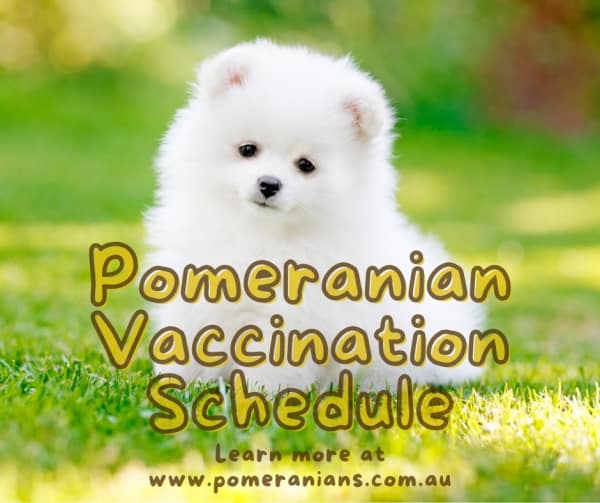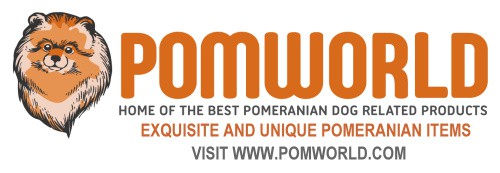Last Updated on February 4, 2021 by Denise Leo
Pomeranian Vaccinations
This article explains in detail why Pomeranian owners, especially new puppy owners must adhere to a Pomeranian vaccination schedule. I will explain details of the required puppy vaccination list, how many vaccinations do puppies need and when do puppies need their shots? A Pomeranian puppy vaccination schedule and why owners must vaccinate puppies.
Core Vaccination Schedule for Dogs
There are certain vaccines that every dog needs to have because they protect the dog against infectious diseases. These are known as core vaccines.
The main viruses that dogs get protected against are:
- Dog adenovirus (C.A.V. types 1 and 2)
- Dog distemper virus (C.D.V.)
- Dog parvovirus type 2 (C.P.V. type 2)
Some countries may/may not add more vaccines to guard against diseases endemic to that country. For example: Here in Australia we’re rabies free so the rabies vaccination isn’t required.
Many years of thorough studies have concluded that the vaccines for Hepatitis, Parvovirus and Distemper core diseases create antibodies that will last for a long period of time. Hence the thought that vets now vaccinate every three years instead of yearly.
You should also know that (with the exception of rabies), dead vaccines don’t protect for very long and so your vet must only use live vaccines. Vets are the only people permitted to deal with live vaccines. If you buy a vaccine from an online shop, it will be a killed vaccine. Anybody who isn’t a vet will only use dead vaccines.
In countries where the law states that dogs must be vaccinated against rabies, you must obey the law. Despite being able to vaccinate every three years, if they law still says yearly, that’s what your vet must do. Some vets are trying to get their parts of the country to change the law to reflect a triennial vaccination.
There are other vaccines not listed as core because they guard dogs against geographic-specific or lifestyle-specific areas. When considering the necessity of using non-core vaccines, weigh up the pros and cons with your vet and decide whether it’s riskier to vaccinate or not.
Vaccinations for Puppies – When do Puppies Get Their Shots?
It’s critical to have your puppy vaccinated because it could very well save his life.
How Many Vaccinations do Puppies Need?
A puppy immunisation schedule is imperative. The vaccinations must be given at the established time while following all guidelines that help him avoid being exposed to any diseases before his protection is complete.
Why Puppies require so many Boosters
When a puppy drinks the colostrum produced by his mother, he also receives immunity to the disease that his mother has been vaccinated against or has faced exposure. This is known as passive transfer of the maternal antibodies. If he didn’t consume the colostrum, he wouldn’t get protection and would be in a high risk category for contracting diseases. There are times when the colostrum is low in quality so he doesn’t get strong good antibodies.
Most puppies do gain this protection by such antibodies for the early weeks of his life. By 8-12 weeks, this passive immunity will diminish so he can actively be immunised via vaccinations.

If his mother’s antibodies are still high, the puppy can’t activate his immune system response to the vaccines until the antibodies from his mother reduce to a low amount (by around 12 weeks).
If the maternal antibodies are low to start with, or don’t even exist, the puppy’s risk of infection is high and can be vaccinated as young as two weeks (during outbreaks) because he’ll be able to respond properly.
Because it’s impossible to gauge the level and protection ability of maternal antibodies, having a puppy booster shots schedule is a wise and safe precaution instead of potentially putting your puppy’s life at risk.
Puppy Pomeranian Vaccination Schedule
Pomeranian Puppy First Vaccination
1st puppy shots should be given by the breeder at 6 to 8 weeks.
Second Pomeranian Puppy Vaccination
2nd Puppy booster shot at 10 to 12 weeks.
Third Puppy Vaccination
Third Puppy booster shot at 16 to 28 weeks.
After this this vaccination puppy can now go outside, visit dog parks and other high risk venues.
First Adult Vaccination
16 to 18 months.
Second Adult Vaccination
After 18 months, unless you’re in a high risk area, consider titre testing.
Pomeranian Puppy Dog Injection Schedule
Non-core vaccines i.e. kennel cough often require more frequent boosters, many are yearly.If a dog is 16+ weeks old, one vaccine is what he needs, plus a first booster at six – 12 months and then he can receive the vaccination every three years (unless other circumstances dictate otherwise). These schedules only apply to core vaccinations with live vaccines.
Adult Pomeranian Vaccination Schedule
Shots for adult dogs will be necessary. It can depend on the disease you’re vaccinating against and also the manufacturer of that vaccine.
However, the latest question is whether this annual process of routinely vaccinating Pomeranians must be done that frequently, or can it be carried out every three years, or even given a miss for older Pomeranians? The answer isn’t a simple one because there are numerous factors that need to be considered.Pomeranian puppy vaccination list explained.
Annual dog check-ups and vaccinations have always been carried out every year until now and nobody has questioned their Veterinarian on the need for annual vaccinations.
An annual health check is a good idea, especially for older Pomeranians. Any health issues can be picked up at an annual health check before issues cause obvious problems.
Which Diseases are Covered in the Vaccinations?
All dogs MUST be given core vaccinations because they protect him from world wide diseases that could potentially kill him. These are:
Canine adenovirus (CAV).
Canine distemper virus (CDV).
Canine parvovirus Type 2 (CPV-2) and variations.
There are other non-core, optional vaccinations that you should discuss with your vet, and they take into account the dog’s lifestyle, where he lives and how high the risk of exposure really is for the dog. Kennel cough is a non-core vaccination.
Kennel Cough is a Non-core Vaccination
Here in Australia, the kennel cough vaccination has caused issues for many Pomeranians and should only be given if your Pom is MUST spend time in a boarding kennel. The anticipated protection against this disease is short term, if at all effective, and must be done yearly.
Kennel Cough vaccinations are similar to the vaccination for the human flu.
Kennel cough vaccination may or may not protect your dog from the current strain of kennel cough.
Pet owners who request that their loved Pomeranian is NOT subjected to a life-threatening kennel cough vaccination often face intimidating behaviour by their veterinarian. If this is the case, don’t try and argue. Just change to a vet who puts the welfare of your Pom first.
It’s more common nowadays for pet owners to change to a different vet, groomer, day care provider or kennel owner, or even arranging to keep their canine in their home. Vaccinations are serious procedures with the potential for a certain amount of risk. To make it worse is that the vaccination generally won’t protect your beloved pet against the dreaded kennel cough and may even cause symptoms that resemble the problem itself. Your dog may also face an anaphylactic reaction.
Many Pomeranians have become extremely ill after receiving kennel cough vaccinations. Actually becoming ill with kennel cough itself or, as I experienced, my Pomeranian developed autoimmune disease a few days after receiving the kennel cough vaccination.
Kennel cough vaccines aren’t recommended except if they must stay in a boarding kennel that demands the vaccination. If that happens, I strongly suggest finding a different kennel facility where you’re not forced to comply with the vaccination rule.
Information on These Deadly Canine Diseases
Is it true that these dog diseases are bad? Read the information below to learn just how bad they can be and why it’s vital that they receive protection.
Canine Parvovirus
What is it and how does it spread?
This virus is extremely contagious and it first attacks your dog’s intestines via the lining. It’s spread when contact is made with faeces that’s infected. It can live on your floor, clothes and shoes for months. Areas of grass that get contaminated stay that way for years (it has been suggested that it can last up to 7 years). It’s a common disease and outbreaks occur where there are a lot of dogs.
Parvovirus Symptoms
Symptoms include:
- Extreme, bloody diarrhoea.
- Severe vomiting.
- Overpowering weakness, often to the point of collapse.
If left untreated, this disease will rapidly get worse and death can occur quickly.
How to Treat Parvovirus
Treating this disease is primarily through supportive care. Your dog will be put on intravenous fluids to stop and reverse dehydration. He’ll also be given anti-nausea medication to help stop the vomiting and antibiotics to protect against a secondary infection. If he has a severe case and has lost a lot of protein, he may also receive blood to improve his health.
Your dog will require plenty of nursing and isolation so he doesn’t spread this disease. Not every dog will survive the Parvovirus but if untreated, 90% of cases usually prove fatal. Puppies are more prone to die because their immune system isn’t strong, and so infection and dehydration overwhelm them faster.
How to Avoid Parvovirus
As this disease is incredibly deadly and very prevalent, you should talk to your vet about the best ways to protect your puppy and the things you should and shouldn’t do.
Generally speaking, keep him inside and only let him play with vaccinated dogs. Never let him walk on grass and maintain this level of care until two weeks after his 16 week vaccination.
If you suspect your dog might have parvovirus, ensure he doesn’t go near any dogs that aren’t vaccinated and ring your vet straightaway. You may have to enter his clinic through a different, safer, door so he doesn’t contaminate the vet’s waiting room.
Even if your dog has fully recovered, he may still be contagious for up to two months so don’t take him to places where other dogs are, including parks. The vet can do a test to determine if he is still contagious.
If you lose a dog to this disease, it’s critical that you remember that virus may survive in the ground for up to seven years. Never let any new, unvaccinated dogs into your home.
Canine Distemper
What is it and how does it get spread?
Distemper is very contagious and it attacks your dog’s urinary, respiratory, nervous and digestive systems.
Vaccinations have been very successful in Australia, the UK and New Zealand that an outbreak is a rarity. Cases occur mainly in the U.S. and Europe. It’s spread through urine, saliva and blood.
Distemper isn’t only a disease that affects dogs. Foxes, ferrets and other wild animals may also have it and can transfer it just as easily.
Distemper Symptoms
Early symptoms may include:
- A high fever.
- Red eyes.
- A discharge (like pus) from the eyes and nose.
Later symptoms may include:
- Diarrhoea.
- Vomiting.
- Lethargy.
- A nagging cough.
- Head tilt, twitches and circling.
- Seizures.
This disease may also harden the nose and footpads and is often referred to as “hardpad disease.”
How to Treat Distemper
Distemper is incurable. Owners often put their dogs down because it’s more humane than letting them live with permanent neurological defects.
How Can You Prevent Distemper?
- The ideal way is through vaccinations.
- Keep your puppy inside until two weeks after the 16 week vaccinations are completed.
- Never let him meet unknown dogs or those that are unvaccinated.
Infectious Canine Hepatitis
What is it and how dies it get spread?
Canine hepatitis is highly infectious and is caused by the adenovirus. In puppies it often proves fatal. It targets the kidneys, liver, eyes and linings in blood vessels and spreads through saliva, faeces, blood, urine and nasal discharge from dogs already infected.
Hepatitis can live in an environment for approx. one year, spreads quickly and is highly dangerous. Dogs may recover but may still be carriers, as the virus in their urine sheds for five or six months.
Hepatitis Symptoms
Symptoms may be mild, severe or anywhere in between and the list includes:
- Fever.
- Vomiting.
- Appetite loss.
- Diarrhoea.
- Coughing.
- Lethargy.
- Depression.
- Tonsillitis
- Pain in the abdomen.
- Opaque cornea (blue eye).
- Liver failure.
- Jaundice.
- Seizures.
- Coma.
Treating Hepatitis
Hepatitis is generally incurable except in very mild cases. Therefore, treatments are aimed at dealing with the symptoms. For example, putting the dog on a drip to stop dehydration. Severe cases may require more powerful treatments including medicine to prevent liver failure, blood transfusions and other fluid therapies. Even if the dog is well cared for, he may still not survive.
How to Prevent Hepatitis
Vaccinating the dog is the first step. This is a part of regular puppy vaccinations anyway. Dogs that have been infected are also carriers for five or six months so their urine may be infectious to dogs around him. It’s vital that once your dog has recovered, he is give his own toilet space so other dogs don’t contract hepatitis through contamination.
Titre Testing for Pomeranian Dogs
We must remember that all dogs are unique, regardless of breed and any other trait.
The guidelines for vaccines have been written to cover “most” dogs in any specific group. So, naturally there will be some that have sufficient immunity to a vaccination and others that simply won’t.
It’s easy to test your dog’s immunity position against core dog diseases through titre testing. The vet would test a small sample of the dog’s blood to determine the level of antibodies against the specific diseases. If your dog does have antibodies, no need to be vaccinated. If he doesn’t have any, he will need the vaccinations.
Then you have the “odd dogs” that are classified as “non-responders.” They never respond to any vaccinations. If it’s a puppy, the maternal antibodies might have been too high and so they hindered the development of the puppy’s antibodies.
It’s wise to do a titre test on puppies living in areas of high risk two weeks after they have had their final vaccination at 16 weeks. This test should indicate any puppies that haven’t developed an immune system response against the vaccine. Vaccinate them once more and then titre test. Generally, they’ll respond at that point.
Final Thoughts
Note that this article is for information purposes only, and is not intended to replace the advice of your veterinarian.
Copyright Pomeranians Australia. All Rights Reserved.
The Pomeranian Handbook



